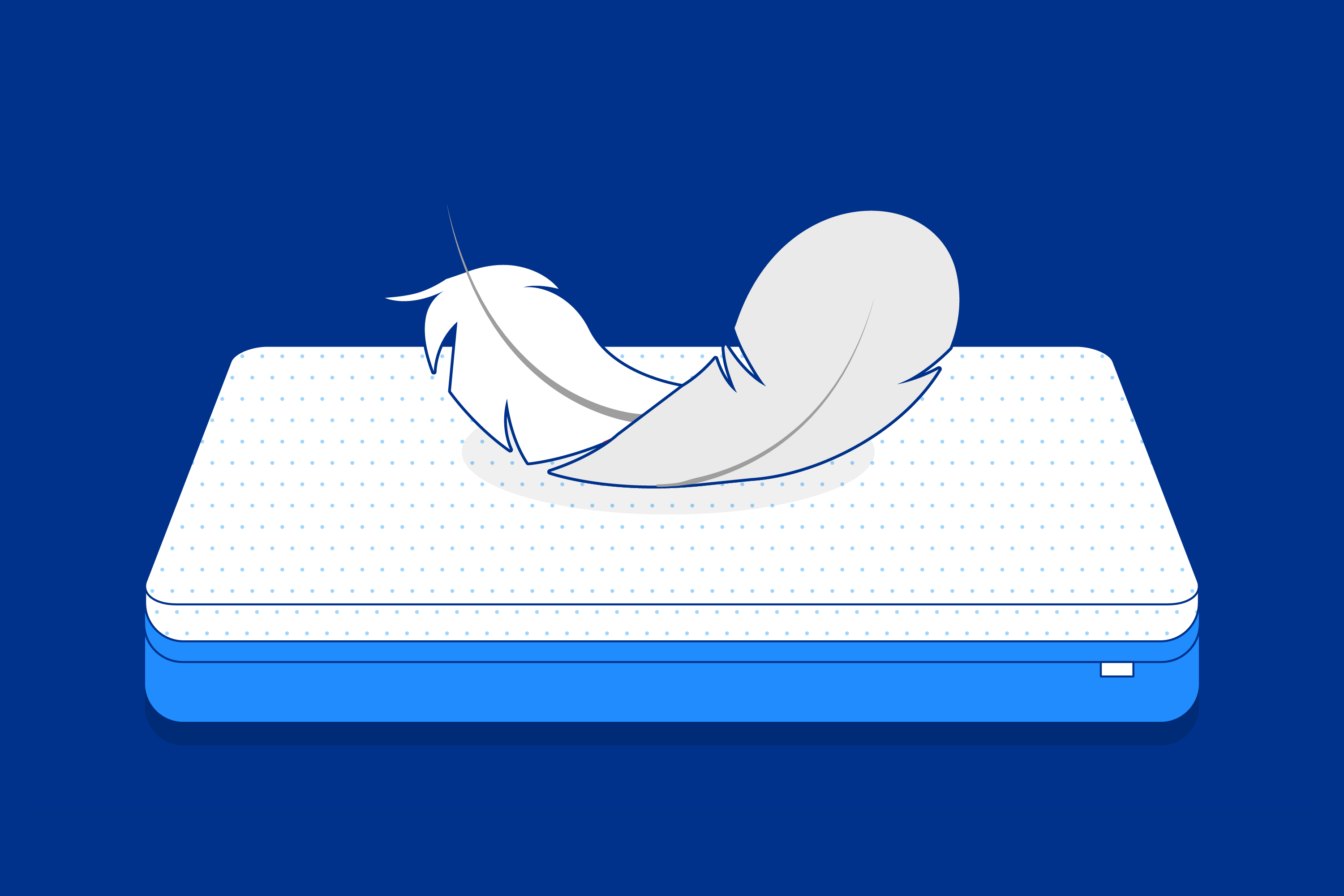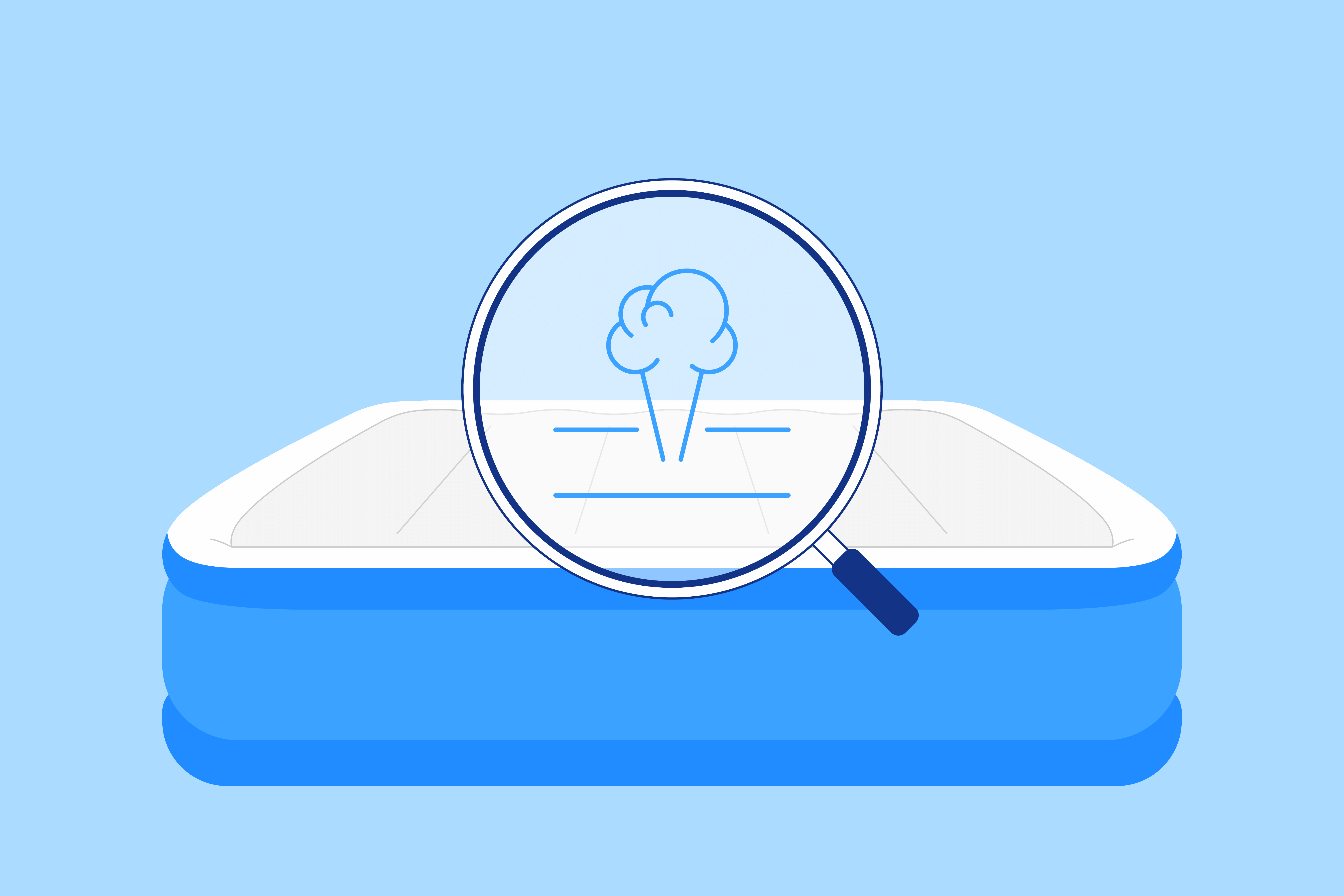Key Takeaways
- Significance of Memory Foam Density: Density is a critical factor in both the durability and comfort of a memory foam mattress. Understanding the density can help in assessing the lifespan and overall quality of the product. Generally, lower density foams are cheaper, but they may wear out faster, while higher density foams are more durable but may have drawbacks related to heat retention and firmness.
- Relationship Between Density and Durability: Memory foam density directly impacts the durability of the mattress. Lower density foams tend to soften and break down more quickly, leading to a shorter lifespan, while higher density foams generally last longer. Assessing density can aid in determining the long-term value of the mattress.
- Considerations Beyond Density: While density is a crucial factor, it does not directly determine mattress firmness or comfort. Various other elements, such as the composition of the foam layers, material quality, and the manufacturing process, also influence the overall comfort and performance of the mattress. Taking these factors into account along with the density can help in making an informed choice.
Density is a concept that can be tricky to understand when shopping for a memory foam mattress, but it remains one of the most important features to check before splurging on a new bed. While memory foam density can’t tell you everything about a mattress, it does play an important role in both durability and comfort.
How is foam density measured? Manufacturers examine how many pounds it weighs per cubic foot. This measurement allows us to quantify the density of the foam by determining the weight of a specific volume of the material. It is a crucial factor in understanding the composition and characteristics of foam, providing a numerical representation of its density and overall quality.
Best Amerisleep Memory Foam Mattresses
Quick Guide: A 30-Second Summary
| Best Memory Foam Mattress Overall | Amerisleep AS3 |
| Best Firm Memory Foam Mattress | Amerisleep AS2 |
| Best Soft Memory Foam Mattress | Amerisleep AS5 |
Why Is Memory Foam Density Important?
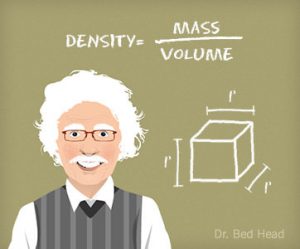 Density is the weight of one cubic foot of memory foam (a 12 inch cube). Density differs as a result of the materials used in the foam construction, and the amount of polymers versus air present in the product. The common range of densities for memory foam is between 2.5 pounds and 7.0 pounds.
Density is the weight of one cubic foot of memory foam (a 12 inch cube). Density differs as a result of the materials used in the foam construction, and the amount of polymers versus air present in the product. The common range of densities for memory foam is between 2.5 pounds and 7.0 pounds.
Generally speaking, foams below 3.5 lbs are considered low density, foams between 3.5 and 5.0 lbs are considered medium density, and foams over 5.0 lbs are considered high density (though definitions can vary by brand). Lower density foams are cheaper to produce because they require less material. Thus, lower-density foam typically costs less.
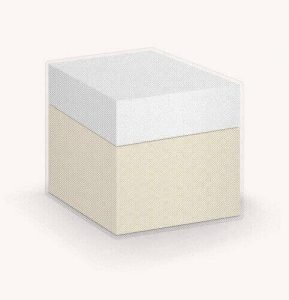
When shopping for a memory foam mattress, it can be important to find out what the density of each layer is. For one, you want to make sure the retailer knows about the product they are trying to sell you. But more importantly, you want to make sure that the bed you are looking at is worth the price, and falls in line with your needs and expectations.
Density can also be important when comparing different brands and models to get an idea of value. In this case, value refers to how long a mattress is expected to last vs how much you’re paying for the mattress.
For example, a mattress that costs you $1500 but lasts 15 years provides better value than one that is $300 but only lasts two years. For the first, you are paying about $100 a year, but for the second you are paying $150, which is less of a deal.
In other words, paying less isn’t the same thing as saving money, which is why it’s crucial to understand the value of a mattress.
Memory Foam Density vs. Support Core Density
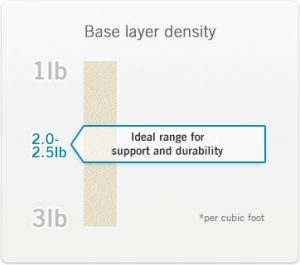 The density of all the layers in a memory foam mattress should be considered when researching beds. Memory foam mattresses typically consist of one or more layers of memory foam over a foam core, and may also include other types of foam as well.
The density of all the layers in a memory foam mattress should be considered when researching beds. Memory foam mattresses typically consist of one or more layers of memory foam over a foam core, and may also include other types of foam as well.
Mattress cores have different rules when it comes to density, as these are designed to support the sleeper and are not viscoelastic. Good density for foam support core is around 2.0 pounds. Lower densities will breakdown earlier and provide less support.
What Memory Foam Density Can Tell You
Density and Durability
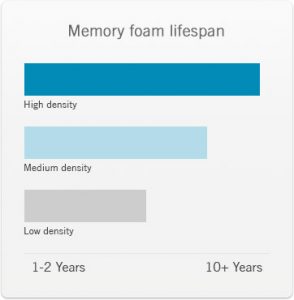 While not the only indicator of quality, density does have an affect on the overall lifespan of the memory foam. Low density memory foam tends to soften and break down at a faster rate than medium and high density foams. This loss of support and resiliency decreases the useful lifespan of the mattress.
While not the only indicator of quality, density does have an affect on the overall lifespan of the memory foam. Low density memory foam tends to soften and break down at a faster rate than medium and high density foams. This loss of support and resiliency decreases the useful lifespan of the mattress.
On average, one can expect a low density memory foam bed to last around 5 years, whereas medium density memory foam lasts 7-8 years and high density foams last 9-10 years. Because a lifespan plays a critical role in value, this is important.
Even though a low density mattress may be cheap, it might need to be replaced twice as often as mattress with medium or high memory foam density. However, as we’re about to discuss, higher-density foams aren’t without fault, either.
Density and Comfort
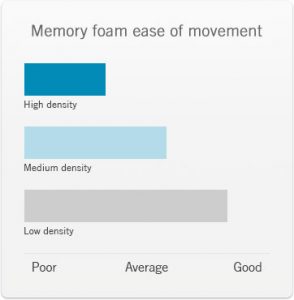 Memory foam density also has significant implications for comfort as well, specifically in the feel of the memory foam, body heat retention, and odor. High density foams tend to feel very viscous, especially temperature sensitive varieties. This can result in a sensation that some describe as being stuck in a hole or trapped in quicksand, making changing positions or getting of bed difficult, and also reducing enjoyment of nighttime activities.
Memory foam density also has significant implications for comfort as well, specifically in the feel of the memory foam, body heat retention, and odor. High density foams tend to feel very viscous, especially temperature sensitive varieties. This can result in a sensation that some describe as being stuck in a hole or trapped in quicksand, making changing positions or getting of bed difficult, and also reducing enjoyment of nighttime activities.
It’s even a common memory foam mattress myth that all such mattresses feel this way. However, less dense foams are less viscous, and thus tend to receive fewer complaints regarding difficulty moving.
Sleeping hot is an important concern for many mattress shoppers, and memory foam density can play a role. Denser foams are more likely to trap heat, since the internal structure of the foam allows less air through.
In general, less than 5% of owners of low density memory foam beds complain of heat versus over 12% of those with high density beds1. In the same regard, about 15% of those who own high density memory foam beds complain of odor, versus 7% with mattresses of low memory foam density.
This is partly why mattress shopping is not as simple as picking the most durable mattress with high-density foam, as dense foams have their drawbacks.
What Memory Foam Density Cannot Tell You
Mattress Firmness
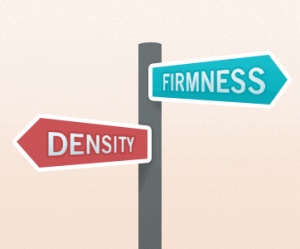 Density and mattress firmness are not necessarily related. You can find both low-density and high-density beds that range from soft to firm.
Density and mattress firmness are not necessarily related. You can find both low-density and high-density beds that range from soft to firm.
Firmness depends more on the firmness of the foam itself, depth of memory foam, the layers used in the mattress, and the ambient temperature (for temperature sensitive foams). It can also depend on how much material is used, as a thicker comfort layer often means a softer mattress.
Mattress Comfort
 Yes, we noted that foam density can affect comfort indirectly by affecting responsiveness and how likely a person is to sleep hot. However, all types of memory foam generally receive good reports of comfort, at least in the first few years. Different people will also prefer different types of beds, so no one memory foam density will be universally comfortable.
Yes, we noted that foam density can affect comfort indirectly by affecting responsiveness and how likely a person is to sleep hot. However, all types of memory foam generally receive good reports of comfort, at least in the first few years. Different people will also prefer different types of beds, so no one memory foam density will be universally comfortable.
Now as foam density can directly affect mattress durability, density can determine how long a mattress will feel comfortable, though other factors like mattress thickness will also need to be considered. But whether or not you will find a particular density comfortable is a matter of personal preference.
Mattress Motion Isolation
All memory foam densities tend to prevent motion transfer between couples equally well, in our research.
Comparing Memory Foam Mattress Density
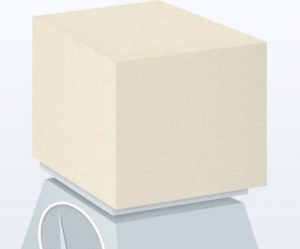 As you can see, density plays an important role in memory foam mattresses, and understanding the concept and how it affects a product can be helpful when looking for the best bed. Keep in mind that not all expensive beds have desirable densities and vice versa.
As you can see, density plays an important role in memory foam mattresses, and understanding the concept and how it affects a product can be helpful when looking for the best bed. Keep in mind that not all expensive beds have desirable densities and vice versa.
Price depends on brands, market and other factors, so be sure to look “under the covers” rather than relying on a brand or price tag to speak for quality. Always ask for detailed specifications when shopping, including core and memory foam layer density. This way, you can make effective comparisons and find the right mattress for your needs.
Frequently Asked Questions
Can you be too heavy for a memory foam mattress?
Yes and no. While it is possible to be too heavy for a specific mattress model due to weight limitations, our team ensures that our memory foam mattresses are designed to accommodate a wide range of body weights.
The density and quality of the memory foam play a crucial role in determining the weight capacity. Higher-density foams tend to have better durability and can support heavier individuals. Therefore, it’s important to select a memory foam mattress with an appropriate density and thickness that suits your weight and provides adequate support.
How do I know if my memory foam is good quality?
To determine the quality of memory foam, there are a few factors to consider. First, look for the foam’s density, which is measured in pounds per cubic foot (lb/ft³). Generally, higher-density foam is associated with better quality and durability.
Additionally, consider the overall feel and performance of the mattress. Good quality memory foam should provide excellent pressure relief, conform to your body shape, and offer proper support. Look for certifications such as CertiPUR-US® that indicate the foam has undergone rigorous testing for safety, durability, and emissions. Lastly, check for reputable brand reputation and customer reviews to gain insights into the quality of the memory foam.
Are there different grades of memory foam?
Yes, there are different grades or qualities of memory foam available in the market. These grades are typically categorized based on foam density. Low-density memory foam (3-4 lb/ft³) is softer and less durable, while high-density memory foam (5-7+ lb/ft³) is firmer and more durable.
Medium-density memory foam (4-5 lb/ft³) strikes a balance between comfort and durability. The grade of memory foam you choose depends on your personal preferences and specific sleep needs.
How many years does a memory foam mattress last?
The lifespan of a memory foam mattress can vary depending on factors such as quality, usage, and care. On average, a high-quality memory foam mattress can last anywhere from 8 to 12 years or more. However, it’s important to note that individual experiences may vary.
Proper maintenance, such as rotating the mattress periodically, using a mattress protector, and following the manufacturer’s care instructions, can significantly extend the lifespan of your memory foam mattress.
Why are some memory foam mattresses so cheap?
Prices of memory foam mattresses depend on several factors. Some mattresses may be cheaper due to lower-quality materials, lower foam density, or less durable construction. Then, the memory foam manufacturing process, mattress brand reputation, and marketing strategies can influence pricing.
As a customer, it’s important to balance cost with material quality and consider factors such as foam density, certifications, warranty, and customer reviews to make an informed decision. At Amerisleep, our team strives to offer affordable memory foam mattresses without compromising on quality, ensuring you receive a bed that meets your needs and provides lasting comfort.
How do you know if a memory foam mattress is worn out?
Over time, a memory foam mattress may start to show signs of wear, though the exact length of time it takes for a memory foam bed to wear out varies. These signs can include sagging, excessive softening, loss of support, or the formation of body impressions that don’t recover quickly.
If you notice discomfort, a lack of support, or an overall decline in sleep quality, it may indicate that your memory foam mattress is worn out. And if you experience pain or discomfort that persists when waking up in the morning, it may be time to consider replacing your mattress.
Does latex foam have a different foam density?
Yes, latex foam typically has different density characteristics compared to memory foam. Latex foam is generally denser than memory foam. The density of latex foam can range from medium to high, usually falling between 4 to 7 pounds per cubic foot. Meanwhile, memory foam has a wider density range.
The difference in density between latex foam and memory foam contributes to variations in their feel, support, durability, and other performance factors.
The Bottom Line
In conclusion, understanding memory foam density is crucial when choosing a mattress. Density plays a significant role in both durability and comfort. Low density foam may be cheaper, but it tends to soften and break down faster, resulting in a shorter lifespan. However, it’s important to find a balance between density, budget and comfort preferences.
When shopping for a memory foam mattress, look for detailed specifications, including the density of the foam material. This will enable effective comparisons and help you find a mattress that meets your needs. Remember to consider factors beyond density, such as certifications, brand reputation, and customer reviews, to ensure the quality of the memory foam mattress.
Ultimately, finding the right memory foam mattress involves considering various factors and personal preferences. By understanding the concept of memory foam density and its implications, you can make an informed decision and select the best mattress that provides both comfort and durability for a restful night’s sleep.
About the author
April Mayer is a sleep expert and writer with a degree in exercise physiology. She has dedicated her career to exploring the relationship between sleep and productivity. Her insightful articles, such as "The Surprising Way Your Mood Might Be Messing With Your Productivity" and "Wake Up to More Productive Mornings," have been featured in reputable publications like Forbes, Greatist, Real Homes, Thrillist, Tom's Guide, and Eat This, Not That. With a passion for helping others lead more productive lives through restful sleep, April offers valuable expertise on foods and vitamins for better sleep. As a trusted member of the Early Bird team since March 2020, she continues to provide informative and well-researched content.
View all posts